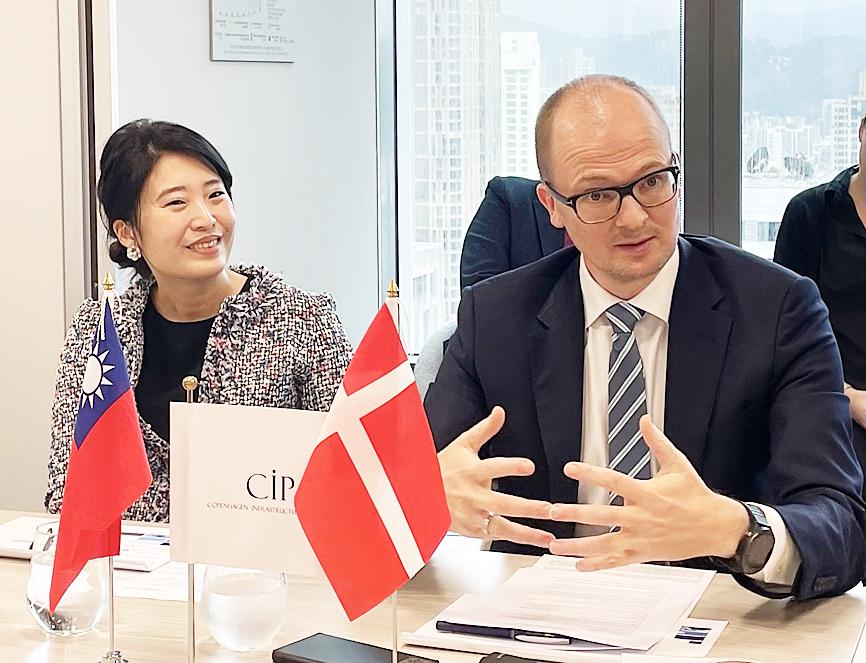Danish firm Copenhagen Infrastructure Partners K/S (CIP) yesterday announced six proposed sites for offshore wind farm projects for its phase 3 development.
Together, the six sites add up to 6.3 gigawatts (GW) in potential capacity.
Four of the proposed sites are in waters more than 50m deep — the limit for fixed-bottom turbine technology.

Photo courtesy of Copenhagen Infrastructure Partners
While floating turbine technology is still in the experimental phase, CIP Taiwan Round 3 Projects chief executive Jesper Krarup Holst described the decision to go into deeper waters as a “no brainer” and urged the government to initiate a pilot project for floating wind farms.
“It’s just a matter of time before the shallow sites are fully utilized,” Holst said. “If Taiwan expects to have more offshore wind, naturally we will have to go further and further offshore.”
“We expect a large part of the capacity in round 3 will be floating technology,” he added.
Aside from opening up capacity, other benefits of going into deeper waters includes fewer controversies to be resolved, Holst said.
Offshore wind farm developers in Taiwan have run into a series of conflicts ranging from fishing rights to aviation safety concerns.
However, floating wind farm technology is not yet ready for large-scale development.
Holst urged the government to enact two or three pilot 100-megawatt (MW) wind farms immediately to gain experience with the emerging technology.
“What’s crucial here is that the pilot project should be delivered fast,” Holst said. “This will allow commercial projects to be delivered after 2025.”
The six sites will be submitted for phase 3 or “zonal development” of the government’s offshore development plan, which will see 1GW of offshore wind capacity allocated per year between 2026 and 2035.
The Ministry of Economic Affairs is still in the process of finalizing the framework for zonal development.
CIP Taiwan project office director Marina Hsu (許乃文) called for continued local content requirements to sustain Taiwan’s nascent offshore wind supply chain.
“There were a lot of naysayers, but we worked hard with our local partners to prove that offshore wind content localization can be done,” Hsu said. “We support the continuation of this policy so that our suppliers can get more volume and prepare to become exporters.”
For phase 2 of offshore wind development, CIP was allocated 600MW for its Changfang and Xidao Wind Farm projects.
There is enough area in the Xidao wind farm that has passed its environmental impact assessment, but will not be developed as part of phase 2 and can serve as a site for a pilot floating wind farm, Holst said.
If the floating wind farm technology can be realized on a commercial scale, Taiwan could potentially develop more wind power than planned, he said.
“We believe that offshore wind can do much more than the 10GW announced” for zonal development, Holst said.

In Italy’s storied gold-making hubs, jewelers are reworking their designs to trim gold content as they race to blunt the effect of record prices and appeal to shoppers watching their budgets. Gold prices hit a record high on Thursday, surging near US$5,600 an ounce, more than double a year ago as geopolitical concerns and jitters over trade pushed investors toward the safe-haven asset. The rally is putting undue pressure on small artisans as they face mounting demands from customers, including international brands, to produce cheaper items, from signature pieces to wedding rings, according to interviews with four independent jewelers in Italy’s main

Japanese Prime Minister Sanae Takaichi has talked up the benefits of a weaker yen in a campaign speech, adopting a tone at odds with her finance ministry, which has refused to rule out any options to counter excessive foreign exchange volatility. Takaichi later softened her stance, saying she did not have a preference for the yen’s direction. “People say the weak yen is bad right now, but for export industries, it’s a major opportunity,” Takaichi said on Saturday at a rally for Liberal Democratic Party candidate Daishiro Yamagiwa in Kanagawa Prefecture ahead of a snap election on Sunday. “Whether it’s selling food or

CONCERNS: Tech companies investing in AI businesses that purchase their products have raised questions among investors that they are artificially propping up demand Nvidia Corp chief executive officer Jensen Huang (黃仁勳) on Saturday said that the company would be participating in OpenAI’s latest funding round, describing it as potentially “the largest investment we’ve ever made.” “We will invest a great deal of money,” Huang told reporters while visiting Taipei. “I believe in OpenAI. The work that they do is incredible. They’re one of the most consequential companies of our time.” Huang did not say exactly how much Nvidia might contribute, but described the investment as “huge.” “Let Sam announce how much he’s going to raise — it’s for him to decide,” Huang said, referring to OpenAI

The global server market is expected to grow 12.8 percent annually this year, with artificial intelligence (AI) servers projected to account for 16.5 percent, driven by continued investment in AI infrastructure by major cloud service providers (CSPs), market researcher TrendForce Corp (集邦科技) said yesterday. Global AI server shipments this year are expected to increase 28 percent year-on-year to more than 2.7 million units, driven by sustained demand from CSPs and government sovereign cloud projects, TrendForce analyst Frank Kung (龔明德) told the Taipei Times. Demand for GPU-based AI servers, including Nvidia Corp’s GB and Vera Rubin rack systems, is expected to remain high,